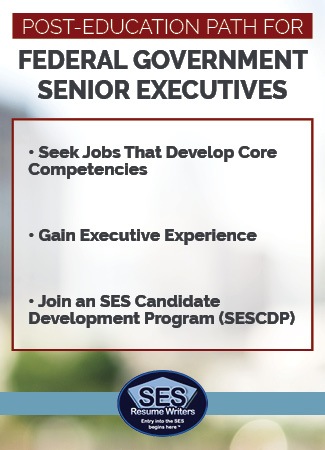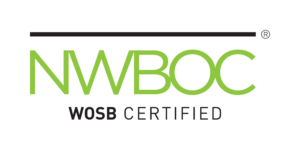From College to the SES: An Expert’s Guide to Federal Employment

Many dream of it, few achieve it — a federal senior executive service (SES) position is a crowning accomplishment in a life dedicated to public work. As such, a senior executive service career path means one with particularly honed skill sets, experiences and a professional presence — all distinguishing you from the crowd to find a place in this challenging, competitive field.
When this level of federal government employment is the goal, it’s not enough to be the top of your class, achieve a leadership-primed role in the private sector and then pivot mid-career into federal upper management. Positioning yourself for moving up in the federal government starts immediately after — if not during — your formative college years and continues well after you graduate, with each decision curating that SES resume.
This guide to senior executive service qualifications maneuvers through the years, giving you industry tips and best advice straight from our SES career coaches. From the right degree for public-service careers to the best post-education path for federal government leaders, we’re paving the way for diligent, achievement-oriented young candidates to realize their SES vision.
What Are the Best Majors for a Senior Executive Service Career Path?
The first big decision when it comes to shaping your senior executive service track begins with your studies in college. While not necessarily the same as the best degrees for politicians, there is overlap between pertinent bachelor degrees for public service fields and those aiming to climb the field’s management ladder.
In general, those looking to maximize their chances of an SES career benefit from a degree — or degrees — that balances leadership development, critical thinking, business comprehension, policy analysis and communication skills:
- Political Science: With its emphasis on political theory, international relationships and public policy, political science majors have a keen understanding of the workings of the public sector and governments.
- Public Administration: Like political science, a public administration major blends theory with practice on how to organize, analyze, manage and lead in the public sector. It is ideal for SES candidates and those wishing to head nonprofits.
- History: A degree in history immerses candidates in the theoretical framework behind human institutions, social attitudes, diversity awareness and strong analytical thinking so desirable in SES positions.
- Business Administration: Those with business administration degrees are uniquely familiar with statistics, management models and styles and often possess formidable oral, written and public speaking skills.
- Economics: The study of producing, consuming and transferring wealth offers keen insights into management and policymaking with the highest levels of federal employment.
- Information Technology/Computer Science: Particularly for those with an emphasis in IT management, cybersecurity or other emerging tech fields, a computer science degree curates a solutions-oriented, data-minded skill set that directly bolsters operations in the public sector.
What Education Level Is Optimal for an SES Career Path?
The optimal level of education depends on what stage of your career you’re currently in. While many individuals with SES-career aspirations ask blanket statements about whether they need a bachelor’s, master’s or even doctorate to land a top position, that answer has less to do with the advanced degree itself and more to do with how it enhances your current professional expertise.
- Bachelor’s degrees are perfectly acceptable for those immediately out of college and early in their career. Higher education is not a requirement for federal employment, but it is highly recommended, as it offers a more linear foothold into your desired department’s management positions.
- Master’s degrees are desirable once you have years of full-time professional experience under your belt and a keener sense of career direction. Master’s degrees may help distinguish you when it comes to upper management and eventually SES applications while also lending you salary and benefits negotiating power.
- A doctorate is still generally not a requirement to land SES jobs. However, if that degree helps you develop the exact SES skills and leadership experience most hiring boards seek, then they should be factored into mid-level career moves.

Should You Seek Government Employment Right Away or Start in the Private Sector?
There are SES benefits to a life-long career in the public sector as well as a career pivot from private into federal work. Again, it is best for candidates to ask what kind of specific SES domain they aim to move into, then determine the sector where they’ll have access to the most relevant, cutting-edge and advantageous experiences and skill development.
Let’s look at the advantages and disadvantages of each path.
- Pros of Internal Government Applicants
There are many advantages to starting your career with the government. Here are a few:
- Hiring preference over external or private sector candidates
- Risk-adverse career stability
- Public sector and industry networking opportunities
- Cons of Internal Government Applicants
Of course, there are also disadvantages to jumping right in:
- Must follow a more rigorous payscale structure
- More beaurocratic red tape
- Generally slower rates of horizontal or vertical career advancement
- Pros of External or Private Applicants
If those disadvantages seem undesirable to you, there are several advantages to starting in the private sector:
- Higher career scalability and a subsequently deeper resume
- Experience with the private sector’s more advanced technology and business processes
- A more innovative and executive-forward resume
- Cons of External or Private Applicants
Once again, there are disadvantages when you don’t spend time in the sector where you want to work:
- Fewer industry-relevant connections
- Less familiarity with federal organizational structures
- Preferential hiring given to internal applicants
What’s the Best Post-Education Path for Federal Government Senior Executives?
Again, the best way to position yourself for a future in SES is to know where you are versus where you need to be. This means assessing the specific skills, project types, leadership experiences and professional development you have under your belt against what needs sharpening. Then find ways to practice the skills or implement the activities which indicate to hiring boards you have the unique mix of qualities for SES success. Here are a few ways you can go about it:
- Seek Jobs That Develop Core Competencies: Try to find work — in the private sector, public sector or both — that develops the skills the Office of Personnel Management (OPM) most highly regards. This means professional appointments across any sector that allow you to sharpen your leadership resume, your strategic planning initiatives, your participation and authority over a team, your financial and technological acumen, your written and verbal communications and your ability to quantify abstract goals into tangible metrics.
- Gain Executive Experience: Align yourself with organizations and departments where there is a clear focus on mentorship and opportunities for advancement. This is the best way for you to start moving up the federal government ladder and gain executive-leadership experience.
- Join an SES Candidate Development Program (SESCDP): After a formidable amount of professional experience and recognition, consider enrolling in an SESCDP — but only one approved by the OPM itself. These programs are built to prepare you for the SES industry, craft your resume and nail every stage of this industry’s unique hiring process.

Federal Jobs for Military Veterans — Should You Spend Time in the Military to Reach Executive Federal Positions?
The short answer is no. Entering any branch of the military does not necessarily distinguish you as a stronger candidate for senior executive service. Nor does it guarantee you have a definitive foothold or a linear, lifelong career path post-enlistment.
The longer answer, however, is it depends. There are a few advantages to military service when it comes to future federal government jobs — but only if you also meet specific eligibility requirements.
Due to the Veteran Preference Act, state and federal agencies do give preferential hiring to military veterans who qualify under special considerations. In a tight hiring race where nearly all other resume factors are equal, those with qualifying military backgrounds will likely receive the favorable appointment based on a hiring points system.
However, it is important to note the Veteran’s Preference Act does not guarantee all veterans a federal job. The preference points system only grants advantages to those who:
- Meet certain dates or campaigns of active-duty service
- Received service badges or awards, notably Purple Hearts
- Have a service-connected disability
What Are the Best Skills for Senior Executive Service Positions?
By the OPM’s own criteria, there are five domains of skills to acquire for eligibility into senior executive service positions.
While these skills aren’t static, they define the core competencies, behaviors and impacts you must cultivate across your professional life if you want to make yourself a strong candidate for senior executive service.
These skills, or Executive Core Qualifications, are as follows:
- Leading Change: The ability to devise and precisely enact organizational change is a leading qualifier on your executive government resume. It is defined by strategic change implemented to achieve larger organization goals, often utilizing innovative, informed and risk-mitigating planning. To prove your Leading Change competency, you must have numerous examples of strategic initiatives you’ve spearheaded, along with the short and long-term impact they brought to an organization.
- Leading People: Aside from the strategic, the OPM prizes the interpersonal — that is, those who can nurture, engage and inspire those around them to perform at greater capacities. Showing a savviness for Leading People can range from leveraging diversity and inclusion in a workplace to providing conflict management, fostering team-building initiatives and instances of mentoring or coaching.
- Results-Driven: Being able to prove the impact of your work can be accomplished quantifiably and qualifiably. To set yourself up for a career in SES, you must be able to narrate both kinds of impact. A Results-Driven skillset is one that can identify problems, ideate out-of-the-box solutions, apply strategic plans and calculate costs and risks. It is technical and decisive while still open to new knowledge and perspectives.
- Business Acumen: The definition of Business Acumen encompasses your breadth and depth of knowledge across a business’ core operations — the financial, the technological and the human capital. Proving management and experience in these operations — as well as their interconnections — will help build a resume for senior executive service.
- Building Coalitions: Last but not least, SES review boards will look for your ability to harmonize disparate institutions, agencies and organizations to achieve goals. This ranges from work with other government agencies, nonprofits, local and state governments, foreign bodies and the private sector.
The best way to begin cultivating SES-career path skills is to take a look at where your proficiencies are now against where they need development. Then, inquire about work assignments or projects at your current place of occupation where you can begin filling gaps. If this isn’t possible, consider a lateral job move that will innately have you performing different roles to round out your resume.

Remember, SES-relevant skillsets and career proficiencies are all about accomplishments and impact, not necessarily technical savvy. The richer your accomplishment stories and quantifiable experiences, the greater your chance of being a top-tier contender.
What Does Automation Mean for Government Jobs and Senior Executive Service Career Paths?
It is impossible to predict exactly how today’s digital revolution will alter the course of senior executive service jobs — much less the entire landscape of federal work. What can be said, however, is that change is inevitable.
Already, we see government jobs that require highly routine or manual tasks disappearing, with the biggest hits targeting accountants, library workers, the postal service and transportation. Some estimates put the percentage of at-risk government work as high as 47 percent.
What can a prospective SES candidate do to stay competitive, and how do you get a federal job when the jobs themselves are changing? We have a few trends to instill confidence and future direction:
- Today’s Federal Government Job Trends
- “Soft skills” still reign supreme: There is no replacement for expert interpersonal exchanges, clear communication, idea generation and the ability to creatively collaborate. These sorts of skills are routinely dubbed “soft,” a word that might lead one to think they’re subservient to the technical or scholarly. This couldn’t be farther from the truth, as surveys from today’s federal managers continually cite the importance of soft skills.
- Emphasis on digital literacy will increase: More jobs than ever rely on digital tasks and procedures which prioritize doing things via technology. More workers need to be able to engage with today and tomorrow’s digital procedures and be comfortable doing so.
- Cross-cultural competency is a must: Working experience with teams, organizations and agencies across diverse subsets will further poise you for tomorrow’s SES success. Not only because it familiarizes you with the world we live in, but because it’s another avenue to master those soft skills so highly valued in federal work.
- Social influence will become a quantifiable result: The ability to connect authentically with groups, sense wants and needs and capitalize on these interactions to inspire results will also become more prized in a digital-first world. It’s a measurable and trackable ability with real-world, cross-organizational results.
- Decisions must be backed with data: There will be a heightened need for leaders who can translate vast amounts of data into clear, precise courses of action — and then implement and track that action over time.
- Tomorrow’s Federal Government Career Landscape
Based on the above trends, there may be a few context adjustments on the most favorable skills for SES positions — but not a complete makeover of the skills themselves. Likewise, these trends do not threaten SES career paths but could tweak what those positions mean and do:
- Telework and schedule flexibility will increase: The public sector has been notoriously slow to adapt growing work trends influenced by the gig-economy, such as remote workforces, flexible scheduling and performance-based incentives rather than hours-based incentives. Federal leadership must be open to telework models in the upcoming decades.
- Certain SES departments will thrive: Those looking for SES positions in information services, cloud and network administration, cybersecurity, energy sectors, public health, healthcare and social assistance, in particular, will likely see high rates of openings. These sectors are on par with projected growth for both relevant public and private institutions.
- Benefits of SES Career Paths and Setting Yourself Up Early
The largest benefit to those set on pursuing an SES career path is the simple fact that these careers are stable yet challenging and rewarding. SES government jobs are inherently filled with the types of skills, traits and behaviors no computer can mimic — meaning they aren’t going anywhere.
- SES has low rates of job insecurity.
- SES receives some of the most comprehensive benefits packages amongst federal workers, even those at the GS 14 or 15 levels.
- SES is a highly visible and influential career with the potential to direct significant federal-level change.
- SES members report high amounts of career satisfaction.
- SES members cite their jobs as being deeply impactful and meaningful.
SES Career Resources and Coaching to Prime Federal Executive Success
There’s no substitute for achieving the federal career goals you’ve held since your formative years. When you partner with SES Resume Writers, those goals become our own.
Our program packages prepare you for every step of the SES hiring process, from initial resume review and ECQ statement drafts to mock interviews and position coaching.

Get in touch today to take charge of your federal career path, and stay in-the-know through our free SES industry newsletter.


